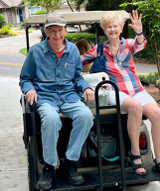Virtual Grief Support Groups Provide Connection
What You Need to Know About Participating in One
Prior to the Pandemic, I wrote an article Should I or Shouldn’t I Join a Grief Support Group referring to in-person groups. Our lives have changed since then. Our new reality is that a virtual connection is the safest way to communicate with others.
My original article was all about getting the courage to walk through the door and sit down among strangers to share your inner most thoughts and feelings as you struggled to heal your grief. In the event of the Pandemic, that strategy has changed because we have gone from in-person groups to virtual connections. The fear doesn’t lie in walking through the door and sitting down among strangers. The new fear feels different. It’s about revealing yourself in front of a camera, in the privacy of your home, still among strangers. However, you may be feeling lonely and secluded because there aren’t other participants sitting next to you that parallel the emotions you are feeling.
You would think that would be an inviting atmosphere to those once reluctant to join an in-person group. However, it has brought about a new set of circumstances that still makes the griever hesitant to give into the world of virtual connection.
To address these lingering fears, I’ve put together a primer of what you might expect in a virtual grief group setting. These points follow the outline of my original article.
1. Virtual grief groups are only for those who are tech savvy. On the contrary, most of us were beginners the first time we clicked on a “link” to connect with others. This includes the facilitators. Virtual has crossed all professions. Lawyers, physicians, CEOs, and other high-profile positions are all in the same predicament of learning for the first time without aid of secretaries and technical support. Following the slogan of the Pandemic, “we are all in this together.” Once you’ve done it, the next time gets easier.
2. Group dynamics may differ. Nothing has changed there. Virtual connections include individuals with varying degrees of loss and unique loss experiences. What has changed is the ability to connect with people from distant cities and states that you wouldn’t have otherwise. And guess what, they feel just like you. We are all in this together.
3. Virtual grief groups are not formal therapy or professional counseling sessions. These groups are for mutual support among individuals going through loss –as a place to share experiences and learn. Virtual groups are not a place to work through the complications of grief or resolve the mental or physical ailments resulting from loss. Just a place to validate how you feel and know that you are not alone.
4. Virtual connections can provide anonymity, if you prefer that. Some people may feel anxious or embarrassed and that is why they choose not to join any group. Perhaps their losses carry stigmas, such as homicide or suicide, or drug overdoses that they don’t want revealed. Men often prefer this too as they don’t wish to discuss loss openly. Let your host know that your camera and microphone will be off, and you may remain silent or speak only at will.
5. Virtual groups do provide some of the same benefits as an in-person group such as:
• Not just a place to vent about your sadness, your uncertainty, your fears, and your shoulda, woulda, and coulda thoughts. It’s a place to learn how to replace these insecurities with action plans to help you move past your hardest moments.
• Allow you to voice your regrets and acknowledge outbursts of anger and guilt. After all, these are real. You are protesting how loss has changed your life. These often-hidden emotions of grief can be uncovered and neutralized with positively reframing your emotions.
• A place for stories and memories. After all, it’s the positive memories that remain long after the pain of grief. They are the keepsakes that honor the lives of our loved ones. Though some memories may fade, others will continue to bring you peace.
• Share your feelings without judgement. We don’t compare losses as no one can determine that his or her loss is more significant than another’s.
• Help you understand that familial and social relationships are often misunderstood following a death. While any support group is not the place to resolve your problems, it can give you a new perspective on how to build the peace.
Virtual groups provide the same kind of emotional support, education, and knowledge that an in-person group would provide.
6. Virtual groups invite and respect the role of all religions and spirituality in grief. These are the core values we honor in life. They play an important role in accepting, healing and moving forward.
7. Virtual groups can help you discover choices that may enrich your life in the future. Healing your grief sometimes involves difficult choices, forward planning, and perseverance. No one can “grieve” for you or determine your future path. You will be challenged by changing values and priorities as a result of loss. A grief group can help you recognize your options and share in your discovery that helps you define “Who am I now?”
8. Virtual groups, like in-person groups, offer HOPE. Hope thrives when you can set goals motivated by the confidence others give you. You are encouraged to establish goal and given suggestions of a path to achieve the goal. Sharing in these groups motivates participants to grow in self-esteem, establish resiliency, and stability in their lives. Hope is the tool that contributes to our well-being and helps us survive.
9. In virtual groups, participants share gratitude for having a connection with others whom they can see and hear, especially when in-person gathering is limited. With permission, group members can decide if they wish to share personal information such as their phone, email, or address with other participants. This is essential for connecting long after the group ends (providing this is a limited week, online group, rather than a continuous support group or drop-in type group.) It’s amazing to see friendships and connections made through virtual shared experiences that benefit each other.
10. Virtual groups will continue to be a service of the future for their long-reaching capabilities. They offer accessibility and convenience for those unable to travel to a meeting (i.e. not transportation, disabled, time-restricted, needed at home). They are widely accepted in best practices of medical, corporation, and various other entities for the value they add.
Don’t shutter or even hesitate when someone suggests connecting virtually with others. Convincing yourself that “this kind of group isn’t for you” may be a hasty decision that excludes you from unconditional support and love.Though we can’t “hug” physically, every person who shares is hugged by the sincerity and friendship that radiates across the waves of technology. Technology is not a barrier. It is a bonus that unites and connects. It’s here to stay and will thrive for those who embrace it.
Resource: Original Article “Should I or Shouldn’t I Join a Grief Support Group?” published Vol. 15 #2, Grief Digest magazine.
About the Author----------------
Nan Zastrow
In 2018,
Wings-a Grief Education Ministry will celebrate its 25th anniversary as a
non-profit organization. Wings was created as a ministry of hope by Nan
and Gary Zastrow after the death of their son, Chad Zastrow. On April
16, 1993, Chad died as a result of suicide. Nan is the author of five
books, a quarterly online grief eLetter and dozens of articles published
in various resources. Since 2003, Nan regularly publishes articles in Grief Digest Magazine. Visit the website at: www.wingsgrief.org or the Wings Facebook page.




